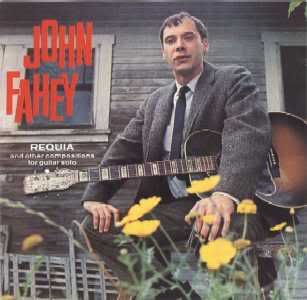
Vanguard, 1967; available
8 track, 44:46
The late John Fahey has always been one of my favorite musical enigmas. Mostly kown for redefining folk (and hating hippies and New Age!), he had a surprisingly adventurous side. REQUIA (subtitled AND OTHER COMPOSITIONS FOR GUITAR SOLO, which isn't entirely accurate) is one of his best early forays into experimental turf. The A-side is typical Fahey: raga/blues/folk fusion guitar excursions played with flair and that distinct Fahey touch. The long "Requiem For Rusell Blaine Cooper" and "When The Catfish Is In Bloom" are particularly delightful, and "Requiem For John Hurt" is pretty good too! The B-side is where it gets weird. The four-part "Requiem For Molly" dominates this side, and it calls Fahey's distaste for psychedelia into question. This epic finds Fahey accompanied by "special effects", IE, musique concrete! Bits and pieces of old blues records, lions roaring, seals barking, public speeches, and other found sounds float under Fahey's irresistible guitar. Oddly enough, the melody for "Part Three" is actually "California Dreaming"! The Mamas and the Papas aren't credited, but there's no mistaking it; in the end that's okay since it actually adds to the collage effect. The effects never really match up with the playing, and Fahey would complain later that he was drunk at the session and the tapes weren't properly cued. However, Fahey was also his own harshest critic, and the piece still sounds remarkable today despite its flaws. The album closes with the brief yet delightful "Fight On Christians, Fight On", leaving the listener wanting more. Luckily, there is a lot more! GUITAR VOL. 4, THE YELLOW PRINCESS, and THE LEGEND OF BLIND JOE DEATH are especially good early works that mix brave experimentation and gorgeous acoustic playing, while the late-period CITY OF REFUGE, THE MILL-POND, and WOMBLIFE would appeal to far more adventurous listeners with their severely dark and abstract nature (the former has particularly aggressive notes by Fahey; I repeat, he REALLY didn't like hippies!). The one-off collaboration with Cul De Sac, THE EPIPHAY OF GLENN JONES, is also quite listenable and interesting. There really isn't a bad Fahey album, but REQUIA is definitely a nice cross section of the man's many sides and is probably the best introduction to his marvelous catalog.

No comments:
Post a Comment